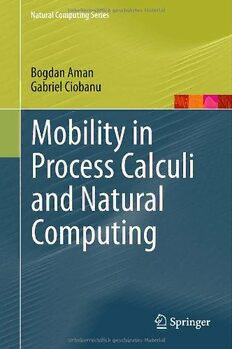Download Mobility in Process Calculi and Natural Computing PDF Free - Full Version
Download Mobility in Process Calculi and Natural Computing by Bogdan Aman, Gabriel Ciobanu (auth.) in PDF format completely FREE. No registration required, no payment needed. Get instant access to this valuable resource on PDFdrive.to!
About Mobility in Process Calculi and Natural Computing
The design of formal calculi in which fundamental concepts underlying interactive systems can be described and studied has been a central theme of theoretical computer science in recent decades, while membrane computing, a rule-based formalism inspired by biological cells, is a more recent field that belongs to the general area of natural computing. This is the first book to establish a link between these two research directions while treating mobility as the central topic.In the first chapter the authors offer a formal description of mobility in process calculi, noting the entities that move: links (π-calculus), ambients (ambient calculi) and branes (brane calculi). In the second chapter they study mobility in the framework of natural computing. The authors define several systems of mobile membranes in which the movement inside a spatial structure is provided by rules inspired by endocytosis and exocytosis. They study their computational power in comparison with the classical notion of Turing computability and their efficiency in algorithmically solving hard problems in polynomial time. The final chapter deals with encodings, establishing links between process calculi and membrane computing so that researchers can share techniques between these fields.The book is suitable for computer scientists working in concurrency and in biologically inspired formalisms, and also for mathematically inclined scientists interested in formalizing moving agents and biological phenomena. The text is supported with examples and exercises, so it can also be used for courses on these topics.
Detailed Information
| Author: | Bogdan Aman, Gabriel Ciobanu (auth.) |
|---|---|
| Publication Year: | 2011 |
| ISBN: | 9783642248665 |
| Pages: | 223 |
| Language: | English |
| File Size: | 2.139 |
| Format: | |
| Price: | FREE |
Safe & Secure Download - No registration required
Why Choose PDFdrive for Your Free Mobility in Process Calculi and Natural Computing Download?
- 100% Free: No hidden fees or subscriptions required for one book every day.
- No Registration: Immediate access is available without creating accounts for one book every day.
- Safe and Secure: Clean downloads without malware or viruses
- Multiple Formats: PDF, MOBI, Mpub,... optimized for all devices
- Educational Resource: Supporting knowledge sharing and learning
Frequently Asked Questions
Is it really free to download Mobility in Process Calculi and Natural Computing PDF?
Yes, on https://PDFdrive.to you can download Mobility in Process Calculi and Natural Computing by Bogdan Aman, Gabriel Ciobanu (auth.) completely free. We don't require any payment, subscription, or registration to access this PDF file. For 3 books every day.
How can I read Mobility in Process Calculi and Natural Computing on my mobile device?
After downloading Mobility in Process Calculi and Natural Computing PDF, you can open it with any PDF reader app on your phone or tablet. We recommend using Adobe Acrobat Reader, Apple Books, or Google Play Books for the best reading experience.
Is this the full version of Mobility in Process Calculi and Natural Computing?
Yes, this is the complete PDF version of Mobility in Process Calculi and Natural Computing by Bogdan Aman, Gabriel Ciobanu (auth.). You will be able to read the entire content as in the printed version without missing any pages.
Is it legal to download Mobility in Process Calculi and Natural Computing PDF for free?
https://PDFdrive.to provides links to free educational resources available online. We do not store any files on our servers. Please be aware of copyright laws in your country before downloading.
The materials shared are intended for research, educational, and personal use in accordance with fair use principles.

